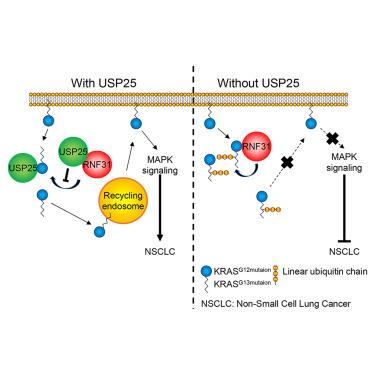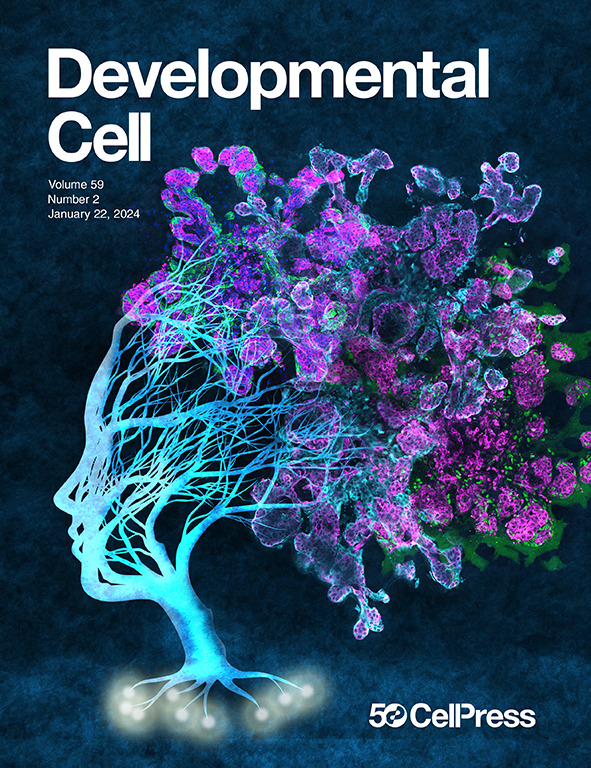KRAS4B oncogenic mutants promote non-small cell lung cancer progression via the interaction of deubiquitinase USP25 with RNF31
IF 8.7
1区 生物学
Q1 CELL BIOLOGY
引用次数: 0
Abstract
Kirsten rat sarcoma viral oncogene homolog (KRAS) oncogenic mutations are genetic drivers in various cancers, including non-small cell lung cancer (NSCLC). However, the regulatory mechanisms underlying the progression of NSCLC driven by oncogenic KRAS mutants are incompletely understood. Here, we show that ubiquitin specific peptidase 25 (USP25) impedes ring finger protein 31 (RNF31)-mediated linear ubiquitination of KRAS oncogenic mutants (KRASmuts) independently of its deubiquitinase activity, which facilitates the plasma membrane (PM) localization and the downstream oncogenic signaling of KRASmuts. Importantly, knockout (KO) of USP25 effectively suppresses tumor growth and RAS signaling in KRASmuts-driven autochthonous NSCLC mouse models and xenograft models, which is restored by additional deletion or inhibition of RNF31. Notably, knockin of USP25C178A in KRasG12D-driven NSCLC models fails to inhibit cancer progression and reconstitution of USP25C178A into USP25 KO A549 cells restores tumor growth. These findings identify previously uncharacterized roles of USP25 and RNF31 in oncogenic KRAS-driven NSCLC progression and provide potential therapeutic targets for KRASmuts-related cancers.

KRAS4B致癌突变体通过去泛素酶USP25与RNF31的相互作用促进非小细胞肺癌的进展
Kirsten大鼠肉瘤病毒癌基因同系物(KRAS)致癌突变是多种癌症的遗传驱动因素,包括非小细胞肺癌(NSCLC)。然而,由致癌KRAS突变体驱动的非小细胞肺癌进展的调控机制尚不完全清楚。在这里,我们发现泛素特异性肽酶25 (USP25)阻碍环指蛋白31 (RNF31)介导的KRAS致癌突变体(KRASmuts)的线性泛素化,而不依赖其去泛素酶活性,从而促进了KRASmuts的质膜定位和下游致癌信号传导。重要的是,在krasmuts驱动的原生NSCLC小鼠模型和异种移植模型中,USP25敲除(KO)可有效抑制肿瘤生长和RAS信号传导,这可以通过额外缺失或抑制RNF31来恢复。值得注意的是,在krasg12d驱动的非小细胞肺癌模型中,敲入USP25C178A不能抑制癌症进展,USP25C178A重组到USP25 KO A549细胞中可以恢复肿瘤生长。这些发现确定了USP25和RNF31在癌性kras驱动的NSCLC进展中的先前未被表征的作用,并为krasmuts相关癌症提供了潜在的治疗靶点。
本文章由计算机程序翻译,如有差异,请以英文原文为准。
求助全文
约1分钟内获得全文
求助全文
来源期刊

Developmental cell
生物-发育生物学
CiteScore
18.90
自引率
1.70%
发文量
203
审稿时长
3-6 weeks
期刊介绍:
Developmental Cell, established in 2001, is a comprehensive journal that explores a wide range of topics in cell and developmental biology. Our publication encompasses work across various disciplines within biology, with a particular emphasis on investigating the intersections between cell biology, developmental biology, and other related fields. Our primary objective is to present research conducted through a cell biological perspective, addressing the essential mechanisms governing cell function, cellular interactions, and responses to the environment. Moreover, we focus on understanding the collective behavior of cells, culminating in the formation of tissues, organs, and whole organisms, while also investigating the consequences of any malfunctions in these intricate processes.
 求助内容:
求助内容: 应助结果提醒方式:
应助结果提醒方式:


